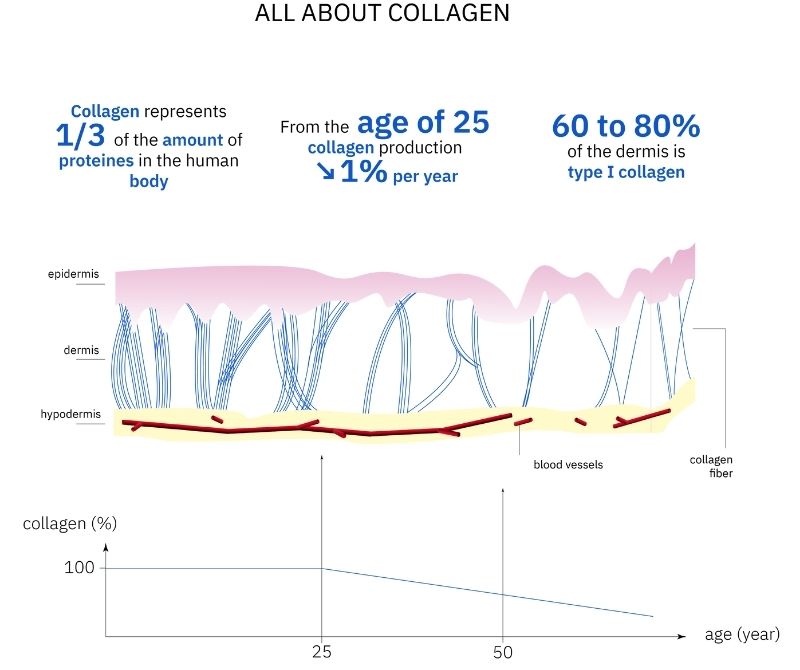Collagen, much more than a beauty asset
Collagen is mainly known for its effects on the skin. However, its importance for the body is much broader!
-What is the importance of collagen for the body?
What is collagen?
Collagen belongs to the protein family. It is even the most abundant protein in mammals. Collagen is an essential component of the body’s extracellular matrix. The latter is a three-dimensional meshwork that plays the role of intercellular “cement” in animals. Collagen forms a complex of fibers present in tissues, bones, and at the base of membranes.
Scientists currently count 28 different types of collagens. These elastic proteins have very specific structures directly responsible for their properties.
What is the role of collagen?
Collagen plays a structural role in our body. It participates in the organization and formation of tissues. Collagen also contributes to the mechanical properties of the body such as resistance to stretching for the skin and ligaments.
What are the different forms of collagen?
As mentioned earlier, there are many types of collagens. The three most found in the human body are type I, II, and III collagens.
Type I collagen
Type I collagen is the most abundant in our body. It is particularly present in the dermis, bones, tendons and ligaments. It plays different roles ranging from healing to skin elasticity while ensuring tissue cohesion.
Type II collagen
Type II collagen is present mainly in cartilage. It is therefore essential in the prevention of age-related joint pain such as arthritis or osteoarthritis.
Type III collagen
Type III collagen is found in organs such as the intestines and in the skin where it acts in concert with type I collagen. A second major aspect is the presence of type III collagen in the internal tissues of the heart and blood vessels. It thus helps to avoid blood vessel ruptures.
It should be noted that type I and III collagens are the most present in human skin. Their proportions are maintained in fixed quantities for healthy skin tissue.
Maintaining collagen reserves
How do our collagen reserves evolve?
Naturally, collagen is broken down in our body by enzymes. These enzymes are the body’s little workers and are essential to the proper functioning of the body.
In addition to the phenomena of degradation, the synthesis of collagen loses efficiency with age. Studies have shown that the content of type I and III collagen varies significantly with age. Collagen regeneration decreases by an average of 1.5% per year with age, starting at age 25. The consequences are a direct impact on skin tension, elasticity, and healing processes. This is how wrinkles appear, lack of flexibility, …
Moreover, collagen is a sensitive protein and lifestyle has a great impact on it. Thus, tobacco, alcohol, stress, or fatigue will weaken the body’s collagen reserves. Similarly, studies have shown that type I and III collagens differ in structural organization and quantity between injured and non-injured people.
Which foods are rich in collagen?
In our diet, collagen is present in the gelatinous parts of broths made from bones and cartilage of meats (veal stock). It is also possible to select foods that reinforce the effects of collagen. The vitamin par excellence is vitamin C. Indeed, vitamin C contributes to the normal formation of collagen to ensure the normal functioning of blood vessels. Vitamin C also contributes to the normal formation of collagen to ensure the normal function of bones, cartilage, gums, skin, and teeth. Vitamins and minerals such as vitamins A, B2, B3 and minerals such as copper or zinc also maintain normal skin.

TIP: Did you know?
There is a difference between bovine collagen and marine collagen. Marine collagen is obtained from fish residues and more precisely from bones, scales, and skin. This collagen has a high bioavailability which means that it is easily assimilated by the body and that there is a good absorption. It also has the advantage of remaining in the body.
Bovine collagen is obtained from the skin and bones of cattle. Due to the history of bovine spongiform encephalopathy (mad cow disease), health vigilance concerning bovine collagen is increased and many standards exist to guarantee its safety. Bovine collagen is not stored in the body.
The benefits of marine collagen in your daily routine:
What are the benefits of collagen for the skin?
The skin is subject to numerous daily alterations due to UV rays, wind, sun, smoke, tobacco, alcohol, stress or age. These deteriorations result in the appearance of wrinkles or thickening of the skin. With age, collagen fibers become shorter, their density and elastin production decrease. The skin loses elasticity and becomes dehydrated. Several clinical trials have shown positive results regarding the use of hydrolyzed collagen on the reduction of deep wrinkles. Similarly, other studies have shown an improvement in skin hydration and elasticity with daily intakes of collagen peptides.
What are the benefits of collagen for the nails?
Fragile nails are a disorder that affects an average of 20% of the population, particularly women, who are twice as affected as men. To this effect, a team of researchers studied the impact of taking 2.5g of collagen peptides daily for 6 months in 25 participants. The researchers found a significant decrease in the frequency of broken nails. After 6 months of treatment, 64% of the women showed an overall clinical improvement.
Summary
Collagen is an essential protein for skin, nails, but also for all tendons, ligaments, and cardiac tissues. As collagen synthesis decreases with age, it is important to ensure a good intake to keep one’s youthfulness.


Key take-home messages


References
Benito-Ruiz et al., A randomized controlled trial on the efficacy and safety of a food ingredient, collagen hydrolysate, for improving joint comfort, International journal of food sciences and nutrition, 2009
Choi et al., Effects of collagen tripeptide supplement on skin properties: a prospective, randomized, controlled study, Journal of cosmetic & laser therapy, 2014
Hexsel et al, oral supplementation with specific bioactive collagen peptides improves nail growth and reduces symptoms of brittle nails, Journal of cosmetic dermatology, 2017
Ottani et al., Collagen structure and functional implications, Micron, 2001
Porfirio et al., Collagen supplementation as a complementary therapy for the prevention and treatment of osteoporosis and osteoarthritis: a systematic review, Brazilian journal of geriatrics, 2016
Ricard-Blum, The collagen family, Cold Spring Harbor Perspectives in Biology, 2010
Shoulders et al., Collagen structure and stability, Annual review of biochemistry, 2009
Sibilla et al., An overview of the beneficial effects of hydrolyzed collagen as a nutraceutical on skin properties: scientific background and clinical studies, The open nutraceuticals journal, 2015

